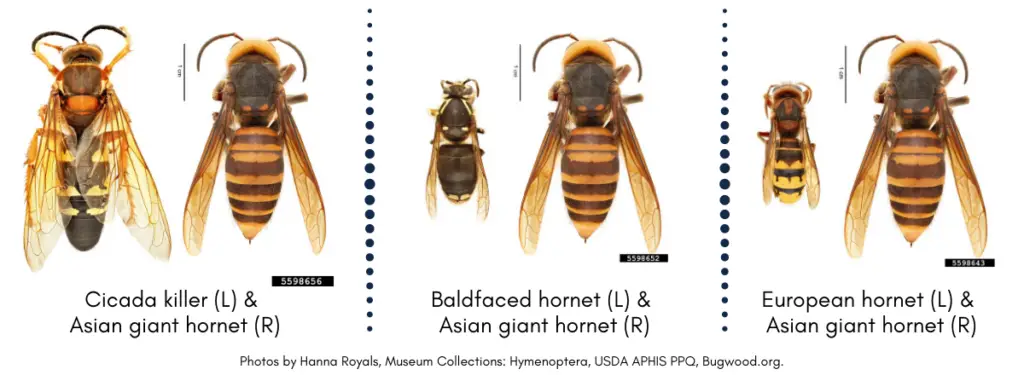Since many authorities classify hornets as those wasps that nest underground, it’s not a stretch to discover that hornets hibernate during the winter.
Hornet workers die during the cold winter months, whereas the queen bee hides in an old hornet nest, under the bark of a tree or in other small openings until she starts are new colony in the spring.
Only mated queens will hibernate and survive the winter. Both drones and workers die from the cold and the fact that food is no longer available.
What do hornets do in the winter?
Mated queens will find a sheltered place protected from the weather and freezing temperatures. This is the practice of both hornets and wasps.

The queen will usually have her wings wrapped around her body. Just because she’s in hibernation, however, doesn’t mean that she can’t or won’t sting. This is something to keep in mind when cutting wood during the winter in places where hornets and wasps are common.
As fall comes, the queen will stop laying eggs that will produce infertile female workers and will instead produce fertile females and males.
The males’ sole purpose is to find a fertile female and mate. They leave the nest soon afterward. The mated females will stay until the weather gets cool, then leave to find a good place to hibernate.
What happens to hornets in the winter?
The mated queens search out a safe, protected place in which to hibernate. She picks a covered place that is not likely to be disturbed.
Some of these places can include the cracks of eaves and wood trim, under loose tree bark, and even in rocks.

The males, or drones, usually leave the nest first to seek out potential mates. They die soon after mating. After the last of the larvae are raised, the workers will leave the nest to find food on their own, their purpose having been fulfilled. Cold weather eventually kills them.
What happens to hornets depends on the species, but the destiny of dying off in winter is fairly common for North American hornet species!
Asian giant hornet – You may have heard of the Asian giant hornet, which has been discovered in the western United States in the last few years. Sightings have been confirmed in both the state of Washington and in British Columbia.
The Asian hornet lives in fairly warm regions and usually nests underground, so the colony does not always die off completely during the winter unless they live as invasive species in other, colder regions, outside their native range.
These hornets usually are 1-1/2 inches long, with the queen growing to as much as three inches long. Their range includes parts of Russia, India, Nepal, Sri Lanka, and most of the Oriental countries. It is common in Japan. They feed mostly on other insects.
It’s been nicknamed the “murder hornet,” as it can be quite frightening, with a stinger up 1/2 inch long and the ability to sting multiple times. However, they only sting to defend their nests or when otherwise threatened.
They also have especially potent venom-containing a neurotoxin. Like other hornets, usually only mated queens survive the winter, usually underground with the others gradually dying off.

European hornet – This hornet was brought to North America by European settlers during the 1800s. Their range extends mostly from the eastern U.S. west as far as Missouri and Arkansas. Some have been reported as far north as Minnesota and as far south as Florida.
The European hornet preys mostly on insects and sugary food such as fallen fruit or sap from several types of trees and shrubs, which they obtain by actually stripping off the bark. They have even been known to steal insects that have been caught by spiders.
They usually only sting when they feel threatened but can also sting to protect a food source, such as fallen fruit. In fall, the workers will scavenge whatever they can, leading to them being seen around picnic areas and garbage cans.
Workers are usually about an inch long, with the queen being slightly longer. Because it’s larger than most common wasps, they do attract notice. They build paper nests made from chewed-up trees and plant fibers, but they can also use inorganic material.

Their nests often resemble the nest of the bald-faced hornet, as they are constructed in much the same way with an outer cover and one entrance hole.
The nests are usually placed in hollow tree trunks but can build nests in buildings. As with other hornets, usually only mated queens survive the winter by hibernating.
Do hornets die in the winter?
Yes. usually, all the hornets die off during winter except for mated queens. They can’t survive cold temperatures and food is no longer available. This may seem like a harsh end, but nature isn’t always pretty and cheerful.
How do hornets survive the winter?
The mated queens hibernate in safe, covered places that look as though they won’t be disturbed and will protect them from the weather and the worst of the cold.

They will often choose cracks in eaves and wood trim or hide behind window shutters, as they may get a little heat oozing from the house. Also, they are less likely to be disturbed near a house.
Hornet queens go dormant to survive the winter
The mated queens do go dormant. However, they aren’t completely helpless. They will sting if disturbed.
This means that care must be taken if you are cutting wood or cutting down trees in the winter, especially if some of the bark is loose.
A hibernating queen that is disturbed can still cause problems.
Are hornet nests empty in the winter?
Hornet nests are usually empty in the winter. All the hornets except for the mated queens die during winter, since they can’t survive cold temperatures and there is no food available.

But for the most part, the queen hides somewhere else that is safer as many animals are known to dismantle and eat hornet’s nests.
Is it safe to remove a hornet’s nest in winter?
It is usually safe to remove a hornet’s nest in winter, but you should be careful not to disturb the hibernating queen. She can still sting if she is disturbed.
Unless the temperature has been way below the freezing point, you should still be cautious about living hornets being left in the nest!
To remove a hornets’ nest, first put on some protective clothing. Then, using a long stick, knock the nest down from its perch. Be sure to stay well away from the nest to avoid getting stung.

Once the nest is on the ground, you can step on it or pick it up and dispose of it.
But you might want to keep the nest as they can bring in a considerable sum of money when sold as home decor online!
Conclusion
Hornets go dormant in the winter, with only mated queens surviving. She usually hides in safe, covered places that will protect them from the weather and the cold.
If you find a hornet nest in the winter, it is usually safe to remove it, but be careful not to disturb the hibernating queen that may still be there!





